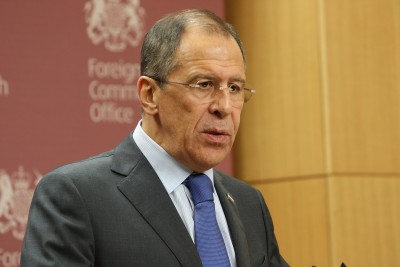Russian Foreign Minister Gets Excluded from OSCE Security Meeting
The annual Organization for Security and Cooperation in Europe (OSCE) Security Council took place between the 1st and 2nd of December in Lodz, Poland, where the Foreign Ministers of the OSCE Countries met. However, the meeting was overshadowed by the back-and-forth situation between the Ministers of some OSCE countries – mainly Poland - and the Russian Foreign Minister Sergey Lavrov.
 Russian Foreign Minister Sergey Lavrov was expelled from the OSCE Security Meeting in Poland because the Polish Government denied his visa. / Picture: © English: Foreign and Commonwealth Office Wikimedia Commons / English: Foreign and Commonwealth Office, OGL v1.0OGL v1.0
Russian Foreign Minister Sergey Lavrov was expelled from the OSCE Security Meeting in Poland because the Polish Government denied his visa. / Picture: © English: Foreign and Commonwealth Office Wikimedia Commons / English: Foreign and Commonwealth Office, OGL v1.0OGL v1.0
The OSCE held its security meeting with the Foreign Ministers of 55 out of 57 OSCE countries – Belarus and Russia excluded –, and other representatives to discuss the most important topics for the OSCE region. Naturally, denouncing the Russian aggression in Ukraine was the top priority on their Agenda, according to Associated Press. The Belarusian Permanent Representative to the OSCE Andrei Dapkiunas, the Belarusian ministry of foreign affairs noted, represented Belarus, since their foreign minister Vladimir Makey died on November 26, a week before the security meeting took place.
Tensions were caused by the non-participation of the Russian foreign minister Sergey Lavrov. According to Reuters, Poland has denied visas for the Russian delegation to attend the Meeting. Later on, Lavrov held a press conference in Moscow, specifically at the same time when the meeting was held. He said that NATO was doing a “Reckless enlargement” and blamed western countries for devaluing the principles of European security. As the Russian news agency TASS reports "I can assert that Poland’s anti-chairmanship at the OSCE will occupy the most unseemly place in the history of this organization. Nobody has ever brought such damage to the OSCE while at its helm," The Russian top diplomat stated. Russia was only represented by its Permanent Representative to the OSCE Aleksander Lukashevich.
The Polish Foreign Minister Zbigniew Rau responded to this, by saying that Russia was trying to shift blame when Lavrov was at fault for the lack of progress and its exclusion. According to Deutsche Welle, Rau was outraged by stating that it is Russia the one who is destroying the OSCE’s foundations and breaking its procedural rules. The dispute between the Polish Foreign Ministry and the Russian Foreign Minister was already expected at this point because on November 19 a Polish government official said that they do not expect Lavrov to sit in the meeting in December, according to The First News. Lukasz Jasina, a spokesperson Polish Foreign Ministry, told the Polish Press Agency that the ministry had informed the Russian delegation about this matter in a diplomatic note. Poland had also banned Russian delegates from attending an OSCE session of the Parliamentary Assembly in Warsaw on November 24-26, The First News stated.
Other representatives said their share on the issue. The German Foreign Minister Annalena Baerbock criticized Russia for holding up peace talks and holding up talks regarding the OSCE budget. Peter Szijjarto, the foreign minister of Hungary, took a more middle-based position. He said that Hungary wants peace in Ukraine, but he also emphasized that the communication channels must be maintained, according to Associated Press.
The OSCE was established in the year 1975 as a platform for dialogue during the cold war, the Associated Press notes. It was founded in Finland, which was neutral during the cold war, and its headquarter is in Austria. Every country can have the chairmanship of the OSCE for a year. For this year, the chairmanship has Poland and next year the chairmanship goes to North Macedonia.
Foreign Minister Schallenberg at the OSCE Security Meeting
Austrian Foreign Minister Alexander Schallenberg also attended the meeting. In addition to the plenary session, Foreign Minister Alexander Schallenberg's program included bilateral talks with the foreign ministers of Ukraine, the United Kingdom, Moldova and Kazakhstan and participation in a side event on "Ending Russia's impunity". “We must do everything we can to preserve the OSCE for the “day after”. The day when diplomacy finds room again. Whenever that day will be. At that point, at the latest, a strong organization is needed. Because the OSCE was never a club of like-minded countries. I therefore very much regret that Russia is not represented today. This is a security policy's own goal”. This was Schallenbergs statement.



